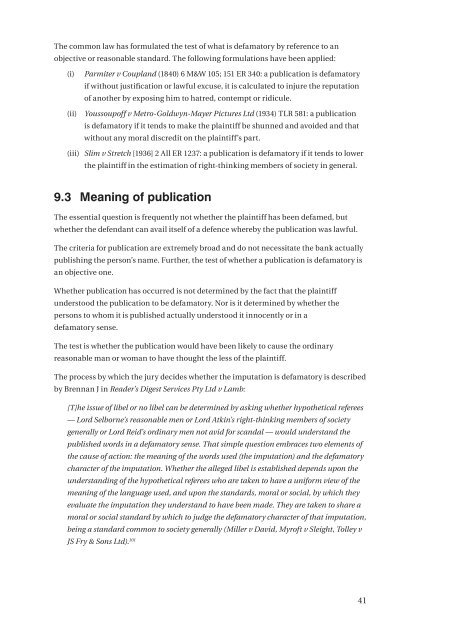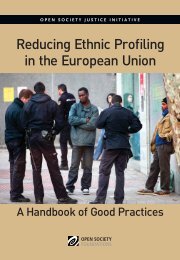Responding to the financial abuse of older people - Loddon ...
Responding to the financial abuse of older people - Loddon ...
Responding to the financial abuse of older people - Loddon ...
- No tags were found...
You also want an ePaper? Increase the reach of your titles
YUMPU automatically turns print PDFs into web optimized ePapers that Google loves.
The common law has formulated <strong>the</strong> test <strong>of</strong> what is defama<strong>to</strong>ry by reference <strong>to</strong> an<br />
objective or reasonable standard. The following formulations have been applied:<br />
(i)<br />
(ii)<br />
Parmiter v Coupland (1840) 6 M&W 105; 151 ER 340: a publication is defama<strong>to</strong>ry<br />
if without justification or lawful excuse, it is calculated <strong>to</strong> injure <strong>the</strong> reputation<br />
<strong>of</strong> ano<strong>the</strong>r by exposing him <strong>to</strong> hatred, contempt or ridicule.<br />
Youssoup<strong>of</strong>f v Metro-Goldwyn-Mayer Pictures Ltd (1934) TLR 581: a publication<br />
is defama<strong>to</strong>ry if it tends <strong>to</strong> make <strong>the</strong> plaintiff be shunned and avoided and that<br />
without any moral discredit on <strong>the</strong> plaintiff’s part.<br />
(iii) Slim v Stretch [1936] 2 All ER 1237: a publication is defama<strong>to</strong>ry if it tends <strong>to</strong> lower<br />
<strong>the</strong> plaintiff in <strong>the</strong> estimation <strong>of</strong> right-thinking members <strong>of</strong> society in general.<br />
9.3 Meaning <strong>of</strong> publication<br />
The essential question is frequently not whe<strong>the</strong>r <strong>the</strong> plaintiff has been defamed, but<br />
whe<strong>the</strong>r <strong>the</strong> defendant can avail itself <strong>of</strong> a defence whereby <strong>the</strong> publication was lawful.<br />
The criteria for publication are extremely broad and do not necessitate <strong>the</strong> bank actually<br />
publishing <strong>the</strong> person’s name. Fur<strong>the</strong>r, <strong>the</strong> test <strong>of</strong> whe<strong>the</strong>r a publication is defama<strong>to</strong>ry is<br />
an objective one.<br />
Whe<strong>the</strong>r publication has occurred is not determined by <strong>the</strong> fact that <strong>the</strong> plaintiff<br />
unders<strong>to</strong>od <strong>the</strong> publication <strong>to</strong> be defama<strong>to</strong>ry. Nor is it determined by whe<strong>the</strong>r <strong>the</strong><br />
persons <strong>to</strong> whom it is published actually unders<strong>to</strong>od it innocently or in a<br />
defama<strong>to</strong>ry sense.<br />
The test is whe<strong>the</strong>r <strong>the</strong> publication would have been likely <strong>to</strong> cause <strong>the</strong> ordinary<br />
reasonable man or woman <strong>to</strong> have thought <strong>the</strong> less <strong>of</strong> <strong>the</strong> plaintiff.<br />
The process by which <strong>the</strong> jury decides whe<strong>the</strong>r <strong>the</strong> imputation is defama<strong>to</strong>ry is described<br />
by Brennan J in Reader’s Digest Services Pty Ltd v Lamb:<br />
[T]he issue <strong>of</strong> libel or no libel can be determined by asking whe<strong>the</strong>r hypo<strong>the</strong>tical referees<br />
— Lord Selborne’s reasonable men or Lord Atkin’s right-thinking members <strong>of</strong> society<br />
generally or Lord Reid’s ordinary men not avid for scandal — would understand <strong>the</strong><br />
published words in a defama<strong>to</strong>ry sense. That simple question embraces two elements <strong>of</strong><br />
<strong>the</strong> cause <strong>of</strong> action: <strong>the</strong> meaning <strong>of</strong> <strong>the</strong> words used (<strong>the</strong> imputation) and <strong>the</strong> defama<strong>to</strong>ry<br />
character <strong>of</strong> <strong>the</strong> imputation. Whe<strong>the</strong>r <strong>the</strong> alleged libel is established depends upon <strong>the</strong><br />
understanding <strong>of</strong> <strong>the</strong> hypo<strong>the</strong>tical referees who are taken <strong>to</strong> have a uniform view <strong>of</strong> <strong>the</strong><br />
meaning <strong>of</strong> <strong>the</strong> language used, and upon <strong>the</strong> standards, moral or social, by which <strong>the</strong>y<br />
evaluate <strong>the</strong> imputation <strong>the</strong>y understand <strong>to</strong> have been made. They are taken <strong>to</strong> share a<br />
moral or social standard by which <strong>to</strong> judge <strong>the</strong> defama<strong>to</strong>ry character <strong>of</strong> that imputation,<br />
being a standard common <strong>to</strong> society generally (Miller v David, Myr<strong>of</strong>t v Sleight, Tolley v<br />
JS Fry & Sons Ltd). 101<br />
41
















